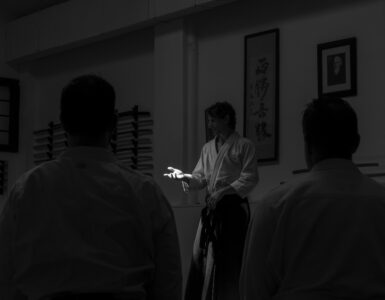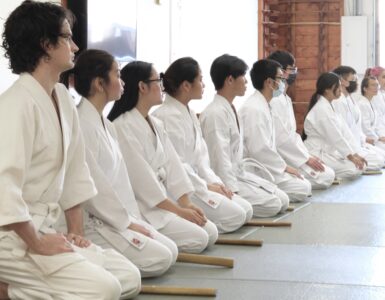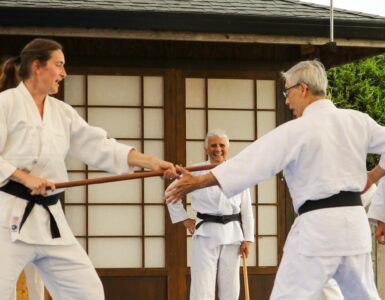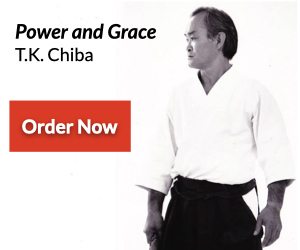The Founder of aikido has been quoted as good-humouredly telling his deshi, “Don’t expect me to teach you. You must steal the techniques for yourselves.” The stealing of techniques, coupled with the relationship known as SHU-HA-RI, is sometimes regarded as the most traditional and appropriate method of learning in Japanese traditional arts. A double transformation takes place. There is a gradual transformation in the learning process, as the deshi in fact learns how to learn by stealing, and this is paralleled by the gradual transformation in the relationship between master and deshi. At the end of the process, the deshi has mastered the kata as the master has presented them, has understood the principles underlying the kata, but also gone beyond the master’s kata and created something of his own. In the case of Japanese traditional arts, the vehicle of this double transformation, the expedient means, is regular training or practice.
To what extent is the stealing of techniques coupled with the SHU-HA-RI relationship? In other words, is it necessary to steal because of what is being stolen, because the latter are techniques, presented as kata—and cannot be learned in any other way? Or, is the stealing necessary because of who they are being stolen from? A master accepts a deshi and the latter is offered a microscopic view of the master in daily pursuit of the art. In some sense formal teaching could never be a substitute for this, since a very close bond is formed between master and deshi and the latter comes to know the master so well that he learns things the master does not show, or is perhaps not even aware of. Thus the possibility of stealing appears to depend on the closeness of the relationship.
Recently, I was discussing these matters with a university colleague and he argued that it was difficult to apply the SHU-HA-RI model to teacher-pupil relationships in a university. The reason for this was not that there was no training based on kata, but that university students were never encouraged by their teachers to progress beyond the SHU stage. If they did progress, this was because they had found out for themselves how to do so: they had not learned it form their teachers.
National universities in Japan have recently become academic corporations and are being forced to respond to market forces. In addition to the sudden need for marketing strategies, a consequence of this need is that knowledge is being offered in an attractive package. Far from students having to petition a master to become deshi and steal his techniques, the doors are left wide open with the goods to be stolen attractively packaged and left in a visible place, labeled “Steal These”, or, more commonly, “Please help yourself to these if you want them”. However, even in this case, my colleague argued that students did not take advantage of these attractive offers. In his opinion there was too much slavish imitation of the teacher at a surface level and very little encouragement even to think of thieving.
There are two issues here that will be considered further in later columns. One is whether, like academic institutions, dojos and martial arts organizations have an economic dimension that fundamentally affects the way the art is practiced. The other issue is whether one can draw a clear distinction in a budo like aikido between stealing techniques from a master and finding out for oneself: in other words the issue is to what extent the training has to be ‘teacher-centered’.












Peter,
Many thanks.This article immediately got my attention as some of the best questions asked about the art. As one still learning, I enjoy being reminded of the most salient aspects. Need as opposed to want will determine the extent one will seek in order to find. In today’s cozy suburban world (some of it anyway) this means the seeker, unless living close to a war zone, needs to be self-driven from within to want answers and make the effort to attain them in living skill.
The power of self-determination obviates being spoon fed and led to god-knows-where.
The ability to “steal” is the ability to notice and noticing is not only 99% of “ki” or the zanshin that precedes nagare but also one of the main keys to both enlightenment and natural survival.
In hunter-gatherer/feudal societies people had a vested interest in noticing/stealing because it meant life! They could not afford to become consumer dull so they steal their skilled elders’ techniques of survival. And if attentive some may go to improve them as well. It’s more than just osmosis, but a real spiritual transmission, which if missed due to lack of attention and receptivity, will shorten the life of the complacent ones in the many variable of natural survival. Having witnessed this playing itself out over the years it translates to the Budo of survivability.
I’m looking forward keenly to your next instalment.
Thanks again,
Nev
More here…..
http://www.aikiweb.com/forums/showthread.php?t=20294
Related to the way we learn, steal, and advance our art is the concept of seeking a coach.
Have you seen this article? http://www.newyorker.com/reporting/2011/10/03/111003fa_fact_gawande
(The URL above should take you to an article by Atul Gawande entitled: “Personal Best: Top Athletes and Singers Have Coaches. Should You?”
Do you think other black belts might benefit from reading it?
Should we seek out an observer or coach when called upon to instruct a class or teach what we know? Or must we wait for the student to ‘steal’ insight?